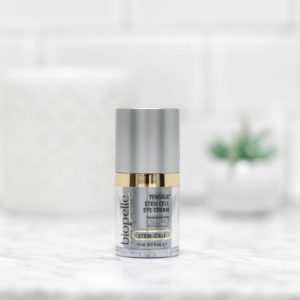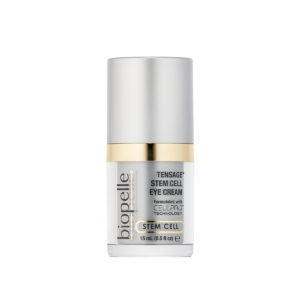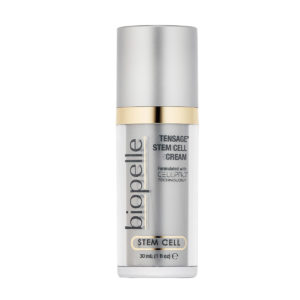How Cellular Function Changes With Age
As we age, stem cell function—which helps with cellular turnover and replication—can decline. This means that with time, the body produces fewer healthy skin cells which can lead to the appearance of fine lines, wrinkles and other signs of aging. Even if you’re avoiding sun and exposure to free radical damage, intrinsic aging factors will lead to the appearance of aging skin. However, supporting stem cells can be part of anti-aging skincare.
What Are Stem Cells and How Do They Work?
Essentially, stem cells are just the body’s raw materials—stem cells create other cells in our bodies that perform more specialized functions. Stem cells replicate and create so-called “daughter cells” that may be other stem cells or specialized cells like blood cells, brain cells, cardiac cells or skin cells. Stem cells are the only cells in the body that can form a new cell type.
When it comes to skin health, stem cells play a vital role in keeping our skin refreshed and renewed. Scientists estimate that humans lose 30,000 to 40,000 dead skin cells every minute. This means skin cells need to replicate much more frequently than say bone cells or brain cells. However, the more times a skin cell divides and replicates, a part of the DNA in the cell called a telomere shortens and frays. After a certain number of replications, telomeres are degraded to a point that they no longer protect the chromosomes they are attached to. Stem cells are able to produce new skin cells with their full telomere length.
How Stem Cells Change Over Time
Just like your age, cells in your body change over time. Skin cells slowly lose their ability to self-renew, and the function that signals stem cells to create new skin cells declines. While environmental factors like sun exposure and free-radical damage can accelerate this process, ultimately, it’s a natural part of intrinsic aging. Even if you practiced perfect preventive skincare (and really, who is perfect) you would still experience this cellular decline.
What does this mean in terms of your skin? In your 20s, you have plenty of healthy collagen fibers and vascular tissue, but you may be experiencing environmental damage that can lead to premature aging. In your 30s, skin regeneration is slowing and collagen fibers lessen—you’re likely to see the first signs of aging. In your 40s, skin thinning can lead to sensitivity, redness and dryness, and age spots become more prominent. At this point, your skin’s cellular function is much less than it was in your younger years. Once you reach your 50s and beyond, your skin’s structure and ability to defend itself are impaired and less efficient in retaining moisture. Both collagen fibers and vascular tissue are significantly reduced.
How Skincare Can Support Stem Cells and Skin Health
Because stem cells create new skin cells, they are very important in anti-aging skincare. Stem cells only activate to create new cells when they are signaled to do so, but that function slows as we age. However, some skincare products can help activate stem cells, encouraging them to create new cells including fibroblasts, a cell that produces collagen, and keratinocytes, the cells most commonly found in the epidermis, or outermost layer of the skin.
Biopelle CellPro™ Technology
Biopelle’s CellPro™ Technology is the only skincare technology clinically proven to help activate stem cells in the skin to differentiate and migrate. The newly formed skin cells—including fibroblasts and keratinocytes—have the ability to help improve the appearance of fine lines and wrinkles as well as restore and maintain firm-looking skin.
CellPro Technology is derived from the eggs of the Cryptomphalus aspersus snail, which contain a stem-cell signaling protein. This protein is extracted and purified in a patented process and is specifically designed to address crepe skin, dullness and fine lines and wrinkles.
Biopelle Tensage Stem Cell—which contains CellPro™ Technology—is clinically proven to help reduce the visible signs of aging, reinforce skin’s integrity, and restore healthy, youthful-looking skin. In a 90 day study with twice daily application, patients saw:
- 119% Increase in collagen
- 50% increase in elastin
- 26% increase in epidermal thickness
Tensage Stem Cell Cream
Tensage Stem Cell Cream is a night cream that helps reinforce skin’s integrity and restore the appearance of radiance, firmness and smoothness to the skin. Tensage Stem Cell Cream combines CellPro™ Technology with retinol and ceramides for increased stem cell activity, cellular turnover and hydration.
Product Benefits
- Reduces the appearance of fine lines and wrinkles
- Skin appears firmer and plumper
- Smoothes rough skin texture
- Evens skin tone
Tensage Stem Cell Eye Cream
 Much like the Stem Cell Cream, Tensage Stem Cell Eye Cream helps combat multiple signs of aging, but this time it is formulated for the delicate skin around the eyes. Tensage Stem Cell Eye Cream helps improve the appearance of crow’s feet, dark circles and puffiness around the eye. This eye cream combines CellPro™ with retinol and caffeine for increased cellular turnover, stem cell activity and circulation.
Much like the Stem Cell Cream, Tensage Stem Cell Eye Cream helps combat multiple signs of aging, but this time it is formulated for the delicate skin around the eyes. Tensage Stem Cell Eye Cream helps improve the appearance of crow’s feet, dark circles and puffiness around the eye. This eye cream combines CellPro™ with retinol and caffeine for increased cellular turnover, stem cell activity and circulation.
Product Benefits
- Helps reduce the appearance of fine lines and wrinkles around the eye area
- Reduces the appearance of under eye puffiness
- Diminishes the appearance of dark circles
- Skin appears firmer and plumper
A Note on Stem-Cell Controversies
If you are above a certain age, you may have some inkling that stem cells were a controversial topic. George W. Bush banned stem-cell research in 2001. But it should be noted that modern stem cell technology doesn’t rely on controversial sources. When the therapeutic use of stem cells first came to the public’s attention in the late 1990s, scientists were deriving human stem cells from embryos. But since 2006 researchers have not been using embryonic stem cells. Biopelle’s technologies have never involved the use of human embryos.
Additionally, when it comes to stem-cell skincare like Biopelle’s CellPro™ Technology, these formulas don’t actually contain stem cells, they just help support them with targeted ingredients meant to activate and reinvigorate stem cell function in the skin.



